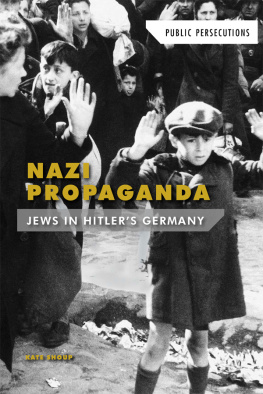Studies on War and Genocide
General Editor: Omer Bartov, Brown University
Volume 1
The Massacre in History
Edited by Mark Levene and Penny Roberts
Volume 2
National Socialist Extermination Policies: Contemporary
German Perspectives and Controversies Edited by Ulrich Herbert
Volume 3
War of Extermination: The German Military in World War II,
19411944
Edited by Hannes Heer and Klaus Naumann
Volume 4
In God's Name: Genocide and Religion in the
Twentieth Century
Edited by Omer Bartov and Phyllis Mack
Volume 5
Hitler's War in the East: A Critical Assessment
Rolf-Dieter Mller and Gerd R. Ueberschr
Volume 6
Networks of Nazi Persecution: Bureaucracy, Business, and the
Organization of the Holocaust
Edited by Gerald D. Feldman and Wolfgang Seibel
NETWORKS OF
NAZI PERSECUTION
Bureaucracy, Business, and
the Organization of the Holocaust
EDITED BY
GERALD D. FELDMAN AND WOLFGANG SEIBEL

Berghahn Books
New York Oxford
First published in 2005 by
Berghahn Books
www.berghahnbooks.com
2005 Gerald D. Feldman and Wolfgang Seibel
First paperback edition published in 2006
All rights reserved.
Except for the quotation of short passages for the purposes
of criticism and review, no part of this book may be reproduced in any form
or by any means, electronic or mechanical, including photocopying, recording,
or any information storage and retrieval system now known or to be invented,
without written permission of the publisher.
Library of Congress Cataloging-in-Publication Data
Networks of Nazi persecution : bureaucracy, business, and the organization
of the Holocaust / edited by Gerald D. Feldman and Wolfgang Seibel.
p.cm. -- (Studies on war and genocide)
Includes bibliographical references.
ISBN 157181177X (alk. paper)
1. Holocaust, Jewish (19391945)--Causes. 2. Holocaust, Jewish
(19391945)--Economic aspects. 3. Germany-Economic policy--19331945.
4. Bureaucracy--Germany--History--20th century. 5. World War, 19391945-
Confiscation and pillage--Europe. 6. Nationalsozialistische Deutsche Arbeiter
Partei. Schutzstaffel. 7. Jewish property--Europe. I. Feldman, Gerald D. II.
Seibel, Wolfgang, 1953 . III. War and genocide ; 6.
D804.3.N483 2004
940.53'181--dc22
2004043734
British Library Cataloguing in Publication Data
A catalogue record for this book is available
from the British Library.
ISBN 1-57181-177-X hardback
ISBN 1-84545-163-5 paperback
Printed in the United States on acid-free paper
Dedicated to the Memory of Roger V. Gould,
19622002

CONTENTS
The Holocaust as Division-of-Labor-Based
CrimeEvidence and Analytical Challenges

LIST OF FIGURES

LIST OF ABBREVIATIONS
| AG | Aktiengesellschaft |
| AOK6 | Armeeoberkommando 6 |
| BdS | Befehlshaber der Sicherheitspolizei und des SD |
| CDC | Caisse des dpts et consignations |
| CDJC | Centre de documentation juive contemporaine |
| CDU | Christlich Demokratische union |
| CGQJ | Commissariat Gnral aux Questions Juives |
| DAW | Deutsche Ausrstungswerke |
| Dego | Deutsche Golddiskontbank |
| DFG | Deutsche Forschungsgemeinschaft |
| DNB | De Nederlandsche Bank |
| DSK | Devisenschutzkommando |
| DVL | Deutsche Volksliste |
| EK5 | Einsatzkommando 5 |
| ERR | Einsatzstab Reichsleiter Rosenberg |
| EWZ | Einwandererzentralstelle |
| FA | Finanzamt |
| FK | Feldkommandantur |
| FRG | Federal Republic of Germany |
| GDR | German Democratic Republic |
| GFP | Geheime Feldpolizei |
| GG | General Gouvernement |
| HJ | Hitler Jugend |
| HSSPF | Hherer SS- und Polizeifhrer |
| HTO | Haupttreuhandstelle Ost |
| HTW | Handelstrust West |
| IfZ | Institut fr Zeitgeschichte |
| Liro | Lippmann, Rosenthal & Co. |
| MBF | Militrbefehlshaber in Frankreich |
| NKVD | People's Commissariat of Internal Affairs |
| NS | Nationalsozialistisch |
| NSBO | Nationalsozialistische Betriebszellenorganisation |
| NSDAP | Nationalsozialistische Deutsche Arbeiterpartei |
| NSV | NationalsozialistischeVolkswohlfahrt |
| OFP | Oberfinanzprsident |
| OK | Ortskommandantur |
| OMGUS | Office for Military Government (U.S.) |
| OT | Organisation Todt |
| PA | Provisional Administrator |
| PK | Propagandakompanie |
| POWs | Prisoners of War |
| RFM | Reichsfinanzministerium |
| RFSS | Reichsfhrer SS |
| RJM | Reichsjustizministerium |
| RKF | Reichskommissar fr die Festigung Deutschen Volkstums |
| RM | Reichsmark |
| RSHA | Reichssicherheitshauptamt |
| RuSHA | Rasse- und Siedlungshauptamt |
| RV | Reichsvereinigung der Juden in Deutschland |
| RWM | Reichswirtschaftsministerium |
| SA | Sturmabteilung |
| SCAP | Service du Contrle des Administrateurs Provisoires |
| SD | Sicherheitsdienst |
| SDHA | Sicherheitshauptamt |
| Sipo | Sicherheitspolizei |
| SK4a | Sonderkommando 4a |
| SNCF | Socit Nationale des Chemins de fer franais |
| SS | Schutzstaffel |
| SS-WVHA | SS-Wirtschaftsverwaltungshauptamt |
| UGIF | Union gnrale des Isralites de France |
| UWZ | Umwandererzentralstelle |
| VVRA | Vermgensverwaltungs- und Rentenanstalt |
INTRODUCTION
THE HOLOCAUST AS
DIVISION-OF-LABOR-BASED CRIME
EVIDENCE AND ANALYTICAL CHALLENGES
Gerald D. Feldman and Wolfgang Seibel
Division of Labor, Networks, and Organized Mass Crime
Organized mass crime is unthinkable without division of labor. The Holocaust is no exception to this rule but, rather, its most horrifying manifestation. Evidence related to the role of government bureaucracy was, to be sure, already part of classic Holocaust research.
Both the planning and the implementation of genocide were carried out in accordance with conventional division-of-labor principles. From 1939 on, the Amt IV, Gegnererforschung und Bekmpfung (Researching and Combating the Enemy) of the Reichssicherheitshauptamt (Reich Security Main Office) with its Department IV B 4, run by Adolf Eichmann, was in charge of anti-Jewish policy. The enforcement of the persecutory measures was delegated to the Staatspolizeileitstellen (State Police Head Offices) or, in the German occupied territories outside the Reich, to the Befehlshaber der Sicherheitspolizei und des Sicherheitsdienstes (SD) (Commanders of the Security Police and Security Service) (BdS). These core institutions, however, were dependent on numerous other institutions and individual participants, state and private, German and, in the occupied territories, domestic agents, for the implementation of the final solution. In the occupied territories in particular, anti-Jewish policy implied resource dependency of the occupation administration and the Berlin central offices.
Next page











